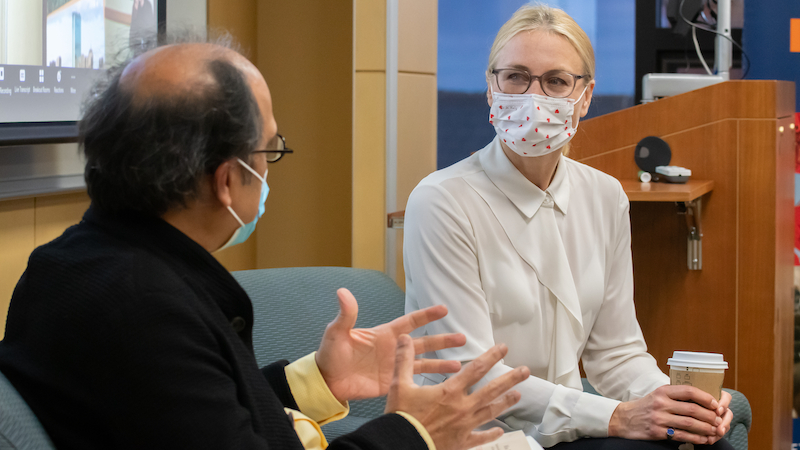
Astrid Wendlandt, Founder and Editor of Miss Tweed, Discusses the Luxury Industry, Journalism, and Russia’s Media Landscape
By Alex Avaneszadeh, MALD 2023 Candidate, The Fletcher School
The Fletcher School hosted alumna Astrid Wendlandt (‘99) for a series of events as a guest speaker on November 3 and 4, 2021. The founder and editor of online luxury and fashion media company Miss Tweed, Wendlandt spoke at three events, including a book talk on her latest publication “How Luxury Conquered the World”(2019), and on the future of journalism and the media landscape in Russia. The three events were organized by the Russia and Eurasia Program, the Institute for Business in the Global Context (IBGC), and the Edward R. Murrow Center for a Digital World.
In discussing her latest book, “How Luxury Conquered the World” (2019), Wendlandt explained that “brands are acting as ambassadors of the country,” selling the French, Italian, British, or American “way of living”. She described China’s societal culture as “communal,” pointing out that Chinese society follows trends and brands as a unit and not necessarily as individuals, representing a rising middle class and growing market for luxury brands. Wendlandt also raised other points regarding the luxury industry’s effect on the environment, sustainability, and society. She highlighted the tension between brands trying to increase sales, yet still meet shareholder demands of protecting the environment.
“The fashion industry is waking up to the fact that they need to…make long lasting products,” Wendlandt said. She underscored that the industry is slowly moving in that direction, and that this will ease the impact on the environment in the long term.
As a former journalist for The Moscow Times and the founder of Miss Tweed, Wendlandt also offered her perspective on the future of journalism.
She emphasized that news has now become a commodity, explaining that “people only have time to read one good story a week,” while political points of view are gradually creeping into various newspapers. Therefore, there is an urgent need to add value to news, and societies are ready for quality independent journalism. Drawing on the work from her media company, she stated that investigative journalism and the acquisition of exclusive news is what people are willing to read and pay for.
Having worked in Russia through the early 1990s, Wendlandt described the post-Soviet environment as one of enthusiasm for democracy and civil society. She also characterized her workplace and colleagues at the Moscow Times, where she worked for two years, as being filled with hope.
She stated that there was “a window of maybe five years under Yeltsin where media was freer,” but that “things turned sour… with Putin’s attitude towards the media.” Russia has cracked down on multiple news outlets that criticize the government, with only a few independent media organizations surviving so the regime can maintain the semblance of having a free press. Government criticism in Russia is not taken lightly.
Russian propaganda tells the Russian people that “the world wants to destroy Russia, and that Putin is their protector,” Wendlandt said. Government media has more leeway in terms of criticizing the government as opposed to private media, since they cannot be labeled as foreign agents.
To conclude, Wendlandt summarized Russian propaganda as centered around portraying the west as immoral and corrupt, with NATO posing a direct threat to Russia’s security.

